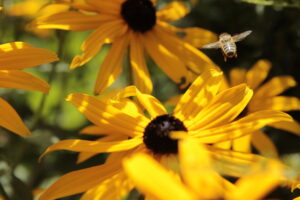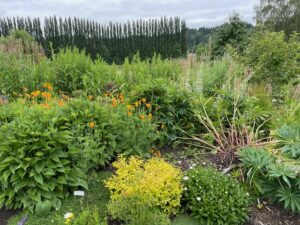Create Your Pollinator Garden
One of the keys to pollinator health is creating gardens with an abundance and diversity of plants for foraging and nesting. Follow these guidelines to create a pollinator friendly environment in your yard and become part of the pollinator pathway.
Think holistically
Planting a pollinator garden goes beyond just putting in plants that will attract pollinators. It’s important to create a habitat where they can thrive. Make sure they have places to nest and plan for soil, sun and water needs.
Choose your location
The location of your garden will determine what kind of plants you can include. Most native plants (and most pollinators!) like to bask in the sun. Find a sunny spot in your yard or create raised beds.
Nurture the soil
Soil is a living thing. It provides nutrients and water for plants, and a nesting place for bees. Soil has a rich ecosystem that stores carbon. When soil is tilled or plowed, carbon is released into the atmosphere, contributing to global warming. You can enrich your soil by adding organic matter in the form of compost. Learn more about soil management and the ecosystem of soil.
Planting a pollinator garden goes beyond just putting in plants that will attract pollinators. It’s important to create a habitat where they can thrive. Make sure they have places to nest and plan for soil, sun and water needs.
Choose your location
The location of your garden will determine what kind of plants you can include. Most native plants (and most pollinators!) like to bask in the sun. Find a sunny spot in your yard or create raised beds.
Nurture the soil
Soil is a living thing. It provides nutrients and water for plants, and a nesting place for bees. Soil has a rich ecosystem that stores carbon. When soil is tilled or plowed, carbon is released into the atmosphere, contributing to global warming. You can enrich your soil by adding organic matter in the form of compost. Learn more about soil management and the ecosystem of soil.
Plant an herb or container garden
Pollinator gardens do not have to be large acreage; container plants, small herb gardens and backyard patches are all effective parts of a pollinator pathway.
If you are limited for space, a container garden of flowers or herbs is a great way to be part of the pollinator pathway. Bees love the tiny flowers of most herbs and you will love the fresh spices for your kitchen. Some Northwest native herbs include lavender, chives, borage, oregano, thyme, basil, bee balm and rosemary. Learn more about planting a container garden.
Pollinator gardens do not have to be large acreage; container plants, small herb gardens and backyard patches are all effective parts of a pollinator pathway.
If you are limited for space, a container garden of flowers or herbs is a great way to be part of the pollinator pathway. Bees love the tiny flowers of most herbs and you will love the fresh spices for your kitchen. Some Northwest native herbs include lavender, chives, borage, oregano, thyme, basil, bee balm and rosemary. Learn more about planting a container garden.
Add native plants to your garden
Native plants grow in harmony with their local environment and create a habitat for native pollinators. Native plants require less water, less fertilizer, can prevent water run-off and improve air quality. Explore our Resources page to find out about native plants and where to buy them.
Native plants grow in harmony with their local environment and create a habitat for native pollinators. Native plants require less water, less fertilizer, can prevent water run-off and improve air quality. Explore our Resources page to find out about native plants and where to buy them.
Provide blooms all summer long
Plant flowers that will bloom at different times from early spring to late fall so pollinators have a continuous food supply.
Plant flowers that will bloom at different times from early spring to late fall so pollinators have a continuous food supply.
Embrace weeds
Weeds are important pollinators. Embrace clover in your yard and let fireweed grow freely. Why you should love weeds.
Weeds are important pollinators. Embrace clover in your yard and let fireweed grow freely. Why you should love weeds.
Provide a safe nesting habitat
Pollinators need safe places to rest, lay eggs and overwinter. For many insect pollinators this means exposed, undisturbed dirt. Up to 70% of native bees nest in the ground. Let leaves and grass clippings remain on the ground as a mulch. Leave plants with hollow stems (raspberries, blackberries, elderberries, hydrangeas) when they die for the season so their stems can provide nests for cavity-nesting bees.
Pollinators need safe places to rest, lay eggs and overwinter. For many insect pollinators this means exposed, undisturbed dirt. Up to 70% of native bees nest in the ground. Let leaves and grass clippings remain on the ground as a mulch. Leave plants with hollow stems (raspberries, blackberries, elderberries, hydrangeas) when they die for the season so their stems can provide nests for cavity-nesting bees.

Avoid pesticides
Pesticides are poisons. They get into the soil and water supply, endangering both pollinators and humans. Instead of dangerous pesticides, use compost and mulch to enrich soil and choose plants that thrive in your environment. Not all pests are bad; avoiding pesticides allows the good bugs to thrive and eat the bad ones.
Rethink your lawn
Lawns are not a viable habitat for pollinators. The pesticides used to keep lawns looking lush get into streams and wetlands. Lawns also require an enormous amount of water. Take steps to convert your lawn into a garden, meadow or rockery. Learn more.
Pesticides are poisons. They get into the soil and water supply, endangering both pollinators and humans. Instead of dangerous pesticides, use compost and mulch to enrich soil and choose plants that thrive in your environment. Not all pests are bad; avoiding pesticides allows the good bugs to thrive and eat the bad ones.
Rethink your lawn
Lawns are not a viable habitat for pollinators. The pesticides used to keep lawns looking lush get into streams and wetlands. Lawns also require an enormous amount of water. Take steps to convert your lawn into a garden, meadow or rockery. Learn more.

